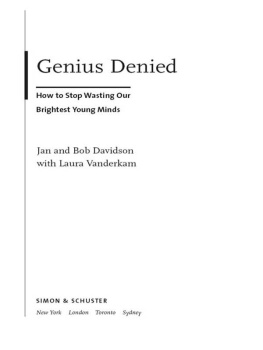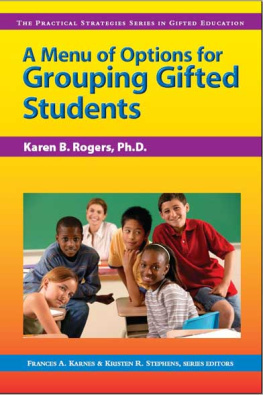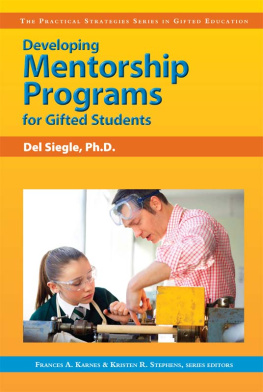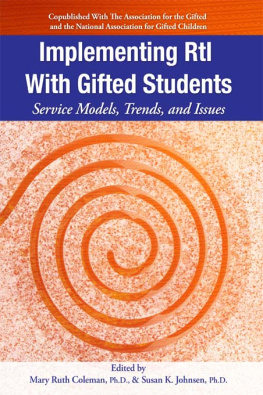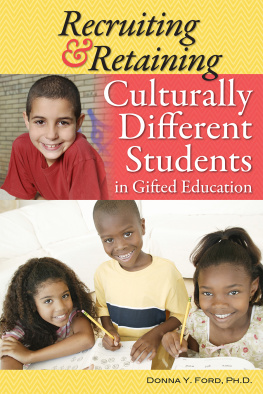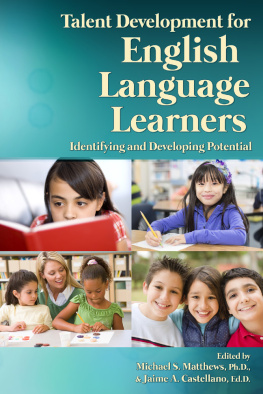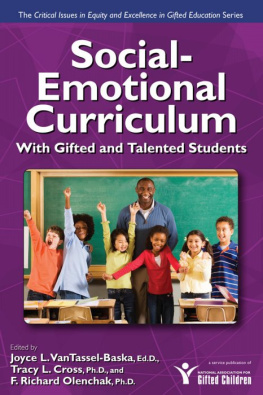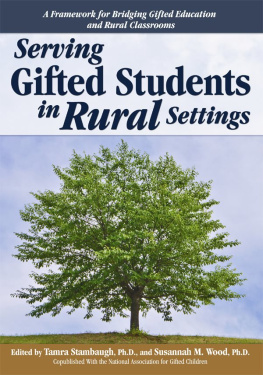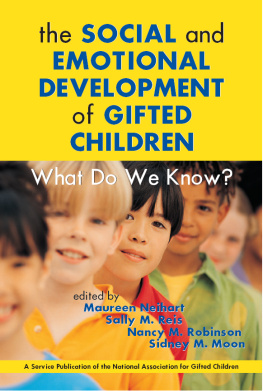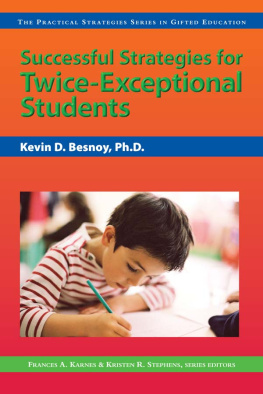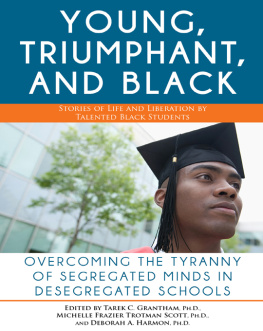FIRST, WE WISH TO THANK the students, parents, and educators affiliated with the Davidson Institute for Talent Development for sharing their stories with us. They told us this book needed to be written, and their generous contribution of anecdotes, research, and time made this book possible. To protect their privacy, we have changed many of the childrens names, but not the details of their lives. These families and educators inspire us in our mission to develop the talent of Americas brightest students.
This book also was supported and influenced by every member of our Davidson Institute team. These talented professionals helped us find the research we needed, helped us clarify our communications, and encouraged us at every point along the way. In particular we wish to acknowledge Marie Capurro, Julie Dudley, Katie Graham, Colleen Harsin, Crissa Haynes, Brennan Johnson, Abby Jones, Travis Rabe, Amy Williams, and Jonathan Wilson.
We received feedback and guidance from several experts in the field of gifted education as this book evolved. In particular, we would like to thank Susan Assouline, Nicholas Colangelo, Tracy Cross, Jim Delisle, Miraca Gross, Sidney Moon, Paula Olszewski-Kubilius, Nancy Robinson, and Joyce VanTassel-Baska. We are grateful for the contributions of Jane Clarenbach at the National Association for Gifted Children, Sandra Berger at the Council for Exceptional Children, Rena Subotnik at the American Psychological Association, and Linda Brody at the Johns Hopkins Center for Talented Youth. This book relied heavily on the work of numerous researchers in the fields of psychology and education. Whenever we needed additional details, they were graciously provided. We are especially indebted to our friend Dr. Julian Stanley, founder of the Johns Hopkins Center for Talented Youth. His work in identifying and nurturing intellectual talent has shaped our mission and our lives.
When we first decided to write a book on gifted education, we approached our good friends Dick Snyder and Laura Yorke to ask for their opinions. Dick and Lauras wise advice gleaned from years in the publishing industry, their enthusiasm for the book, and their feedback on structure and content helped us move from idea to manuscript. Many thanks to our agent, Carol Mann of the Carol Mann Agency, for her guidance in the development of this book and for securing its placement with Simon & Schuster. Bob Bender, senior editor at Simon & Schuster, is a superb editor and advocate. We are grateful for his guidance and advice, and for the help of his assistant, Johanna Li. We worked with Simon & Schuster over a decade ago to copublish several Davidson & Associates educational software titles, so we value the opportunity once again to be associated with the companys talented team of professionals.
We wish to thank Laura Vanderkam for her contribution as the writer of this book. Laura is not only a talented young writer, but as a gifted young person herself, she brought to the book her own unique perspective and understanding of the obstacles our society sometimes places upon its brightest young citizens. Our relationship with Laura in the creation of this book made the process particularly satisfying. We greatly value her contribution and the friendship that has evolved from our working together. She wishes to thank USA Today Forum page editors Chris Collins and Glen Nishimura for publishing her column on radical acceleration, Some Can Sail Over High School, in August 2002. That column caught our attention and led to this writing partnership.
Many thanks to our family and friends for taking an interest in our work and politely listening as we have talked about Genius Denied for the past two years. In particular we thank our children, Liz, Emilie, and John, who continually help us grow as people and as parents.
Jan and Bob Davidson
About the Gifted Education Program (online). Jefferson City, Missouri: Missouri Department of Elementary and Secondary Education, 2003 (cited 4 April 2003). Available at http://www.dese.state.mo.us/divimprove/gifted/abgifted.html.
Aizenman, Nurith C. Students Complicated Gifts: Schools Struggle with Exceptional Learning Disabled. Washington Post, 23 June 2002, sec. A, p. 1.
Albert, Robert S. The Contribution of Early Family History to the Achievement of Eminence. In Talent Development, vol. 2, ed. by Nicholas Colangelo and Susan Assouline (Dayton, OH: Ohio Psychology Press, 1994).
-----. Exceptionally Gifted Boys and Their Parents. Gifted Child Quarterly 24, no. 4 (1980): 174-79.
-----. Genius and Eminence. Edited by Michael Argyle, 6 vols. Vol. 5, International Series in Experimental Social Psychology (Elmsford, NY: Perg-amon Press, 1983).
Allan, Susan D. Ability-Grouping Research Reviews: What Do They Say About Grouping and the Gifted? Educational Leadership (1991):60-67.
Archambault, Francis X. Jr., et al. Regular Classroom Practices with Gifted Students: Result of a National Survey of Classroom Teachers (Storrs: National Research Center on the Gifted and Talented, University of Connecticut, 1993).
Assouline, Susan. Psychological and Educational Assessment of Gifted Children. In Handbook of Gifted Education, ed. by Nicholas Colangelo and Gary Davis (Boston: Allyn and Bacon, 2003), pp. 124-45.
Assouline, Susan, and Nicholas Colangelo. Self-Concept of Gifted Stu-dents. TEMPO, Texas Association for Gifted Newsletter 15, no. 3 (1995):5-8.
Assouline, Susan, and Ann E. Lupkowski. Extending the Talent Search Model: The Potential of the SSAT-Q for Identification of Mathematically Talented Elementary Students. In Proceedings of the Henry B. and Jocelyn Wallace National Research Symposium on Talent Development, ed.by Nicholas Colangelo, Susan Assouline, and DeAnn Ambroson (New York: Trillium Press, 1992), pp. 22332.
Assouline, Susan, and Ann E. Lupkowski-Shoplik. Talent Searches: A Model for the Discovery and Development of Academic Talent. In Handbook of Gifted Education, ed. by Nicholas Colangelo and Gary Davis (Boston: Allyn & Bacon, 1997), pp. 170-79.
Assouline, Susan, and Ann Shoplik. Developing Mathematical Talent: A Guide for Teachers and Parents of Gifted Students (Waco, TX: Prufrock Press, 2002).
Baker, Jean A., Robert Bridger, and Karen Evans. Models of Underachievement Among Gifted Preadolescents: The Role of Personal, Family, and School Factors. Gifted Child Quarterly 42, no. 1 (1998): 5-15.
Baldwin, Alexinia Y. Programs for the Gifted and Talented: Issues Concerning Minority Populations. In The Gifted and Talented: Developmental Perspectives, ed. by Francis Degen Horowitz and Marion OBrian (Washington, DC: American Psychological Association, 1985), pp. 197-221.
Banks, David. Clusters of Talent (online). Classification Society of North America Newsletter 48 (1997) (cited 10 April 2003). Available at http://www.pitt.edu/~csna/news/csna.news48.html.
Benbow, Camilla Persson, and David Lubinski, eds. Intellectual Talent (Baltimore, MD: Johns Hopkins University Press, 1996).
Benbow, Camilla Persson, David Lubinski, and Hossain E. Sanjani. Our Future Leaders in Science: Who Are They? Can We Identify Them Early? In Talent Development, vol. 3, ed. by Nicholas Colangelo and Susan Assouline (Scottsdale, AZ: Gifted Psychology Press, 1999), pp. 59-70.
Benbow, Camilla Persson, and Lola L. Minor. Cognitive Profiles of Verbally and Mathematically Precocious Students. Gifted Child Quarterly 34, no. 1 (1990): 21-26.

